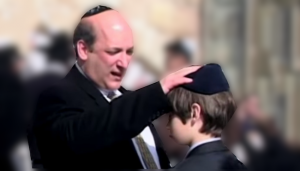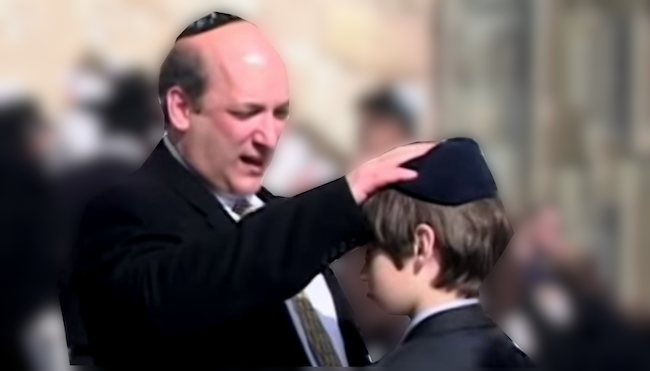
BS”D
Volume 37, No. 41
25 Av 5783
August 12, 2023
Sponsored by:
Nathan and Rikki Lewin in memory of his father Harav Yitzchak ben Harav Aharon Lewin a”h (28 Av)
Micheline and David Peller in memory of their daughter Zipporah a”h bat David
We read in this week’s Parashah (14:1), “You are children to Hashem, your Elokim.” Midrash Kohelet Rabbah comments: We read (Kohelet 4:8), “There is One, and there is no second, and He has no son or brother. . .” “There is One”–This is Hashem, about Whom we read (Devarim 6:4), “Hashem is our Elokim, Hashem is the One and Only.” “There is no second”–Hashem has no partner. Nevertheless, Hashem loves us, the Jewish People, and calls us His “children,” as we read (in our Parashah), ““You are children to Hashem,” and His “brothers,” as we read (Tehilim 122:8), “For the sake of My brothers.” [Until here from the Midrash]
R’ Yaakov Meir Shechter shlita (Rosh Yeshiva of Yeshivat Sha’ar Ha’shamayim in Yerushalayim) writes: These expressions reveal, on the one hand, how lofty the souls of the Jewish People are, and, on the other hand, how humble Hashem is, for He loves the Jewish People and connects to us as if we were His children and siblings. This is something on which we should reflect.
The Midrash Tanna D’vei Eliyahu records: Hashem says, “There are two things in the world that I love completely: the Torah and the Jewish People.” Hearing this, someone asked Eliyahu Ha’navi, “Which does Hashem love more?” Eliyahu Ha’navi responded, “People say that He loves the Torah more, but I say that He loves the Jewish People more.” The Zohar adds: “If people knew how much Hashem loves them, they would roar like lions cubs as they pursue a connection with Him.” R’ Shechter notes: This applies to every single Jew–no exceptions. (Sefer Osef Amarim: Midot p.330)
********
“See, Anochi / I present before you today a blessing and a curse.” (11:26)
R’ Yehuda Modern z”l (1819-1893; Rosh Yeshiva in Sighet, Hungary) writes: Earlier commentaries quote a Midrash stating that the word “Anochi” in this verse alludes to the first of the Ten Commandments: “Anochi / I am Hashem, your Elokim.” However, the Midrash does not explain what the significance of this allusion is. It appears, R’ Modern writes, that the message of the Midrash is as follows:
Our Sages teach that we are sustained in this world in the merit of our Emunah / faith. On the other hand, our Sages teach that we are not rewarded for our Mitzvot in this world; rather, the reward for our Mitzvot will be forthcoming in the World to Come. But how can this be? Is there not a commandment in the Torah that a worker be paid on the same day that he worked? Thus, we should be rewarded for our Mitzvot the same day we perform them!
The answer, R’ Modern writes, is that there is an exception. Specifically the Mitzvah to pay workers the same day does not apply if workers were hired through an agent. [The reasoning for that Halachah is beyond the scope of this space.] Since Hashem gave the Torah through an agent (Moshe), Hashem is not obligated to pay us for observing the Torah on the same day as our Mitzvah performance, and He can pay us in the World to Come instead.
However, R’ Modern continues, there are two Mitzvot which Hashem did teach us directly–the first two of the Ten Commandments, which our ancestors heard at Har Sinai directly from Hashem. For those Mitzvot, which encompass the commandment to have Emunah, Hashem must reward us in this world. Hence our Sages’ teaching that we are sustained in this world in the merit of Emunah. “See,” says our verse, “because of Anochi I give you a blessing or curse today!” (Pri Ha’eitz)
********
“It shall be that the place where Hashem, your Elokim, will choose to rest His Name–there shall you bring everything that I command you: your elevation-offerings and your feast-offerings, your tithes and what you raise up with your hands, and the choicest of your vow offerings that you will vow to Hashem.” (12:11)
The “place where Hashem, your Elokim, will choose to rest His Name” is the Bet Hamikdash. Similarly, in his Halachic code, Mishneh Torah, R’ Moshe ben Maimon z”l (Rambam; 1135-1204; Spain and Egypt) titled the laws of the Bet Hamikdash–“Hilchot Bet Ha’bechirah” / “The Laws of the Chosen House.”
R’ Yitzchak Aryeh Wormser z”l (1768-1847; the “Ba’al Shem of Michelstadt) comments: The Bet Hamikdash is a physical “home” for Hashem. But the name “Bet Ha’bechirah” suggests that a person must also build a spiritual “home” for Hashem within himself. How? By exercising his Bechirah / free will appropriately to make good choices. As the verse (Devarim 30:19) says, “U’vacharta ba’chaim” / “Choose [eternal] life.” (Ba’al Shem Mi’Michelstadt p.260)
********
“You will rule over many nations, and over you they will not rule.” (15:8)
R’ Yoel z”l (17th century or earlier) writes: Since the Torah contains no punctuation, the first part of this verse can be read, “You will rule over many nations, and over yourself.” A person should rule over himself so he does not sin. (Sefer Ha’remazim Le’Rabbeinu Yoel)
********
“You shall not eat Chametz with it [the Korban Pesach], for seven days you shall eat Matzot because of it, bread of affliction, for you departed from the land of Egypt Be’chipazon / in haste . . .” (16:3)
R’ Aharon Lewin z”l Hy”d (the Reisher Rav; killed in the Holocaust) writes: From the laws of Matzah, we can learn how a person should conduct himself. Halachah requires that the dough for Matzah be kneaded with “Mayim she’lanu” / water that was drawn the day before and sat overnight. This teaches us that every act we undertake should be approached with deliberation, not jumped into suddenly without proper evaluation or preparation. Experience shows, R’ Lewin writes, that people often get an idea and “run with it,” only to realize when it is too late that it was a bad idea.
In contrast, once the flour and water for the Matzah have been mixed, Halachah requires that the process proceed quickly and smoothly without interruption. This, R’ Lewin writes, is how we should act once we have begun the deed or project about which we previously deliberated. (Ha’drash Ve’ha’iyun 111)
Why did Bnei Yisrael depart from the land of Egypt “Be’chipazon” / “in haste”? R’ Shlomo Eliasof z”l (1841-1926; leading early 20th century kabbalist; grandfather of R’ Yosef Shalom Elyashiv z”l) explains:
In Egypt, Bnei Yisrael were deeply mired in that nation’s impurity. Hashem revealed His “Light” in Egypt because of His covenant with our Patriarchs, in order to weaken the impurity that, in effect, held Bnei Yisrael hostage. When He did so, He uprooted the Yetzer Ha’ra from Bnei Yisrael and sanctified them.
However, Hashem’s design of the world requires that there be a Yetzer Ha’ra and that man exercise his Bechirah / free will to overcome it. Therefore, in order that the Yetzer Ha’ra not be destroyed entirely by Hashem’s “Light,” Hashem had to make His revelation brief. Therefore, Bnei Yisrael had to leave in haste.
R’ Eliasof adds: The prophet Yeshayah (52:12–next week’s Haftarah) prophesies about the future redemption, “You shall not go forth Be’chipazon.” At that time, R’ Eliasof explains, the Yetzer Ha’ra will, in fact, be eliminated. Therefore, there will be no reason for Hashem to limit His revelation and no reason for haste. (Niglot Leshem Shvo V’achlamah)
********
Shabbat
The Gemara (Shabbat 118b) teaches: If only the Jewish People would observe two Shabbatot in accordance with the law, they would be redeemed immediately. [Until here from the Gemara]
R’ Yitzchak Hutner z”l (1906-1980; Rosh Yeshiva of Yeshiva Chaim Berlin in Brooklyn, N.Y.) notes that we allude to the connection between Shabbat and the Redemption in the poem Lecha Dodi, which we recite on Friday night. There we read, among other stanzas, “Shake off the dust–arise! Put on your splendid clothes, My people, through the son of Yishai the Bethlehemite! Draw near to my soul–redeem it!”
R’ Hutner observes: The Shulchan Aruch / Code of Jewish Law expressly requires one to begin Shabbat preparations on Friday morning. This is not simply a manifestation of the general requirement to perform Mitzvot with Zerizut / diligence, R’ Hutner writes. Rather, as Rambam z”l writes: “One should sit and wait solemnly to receive the ‘face’ of Shabbat, as if one were going to greet a king.” In order to accomplish this, one must begin his Shabbat preparations in plenty of time. [The expression, “the face of Shabbat” will be explained next week, iy”H.]
R’ Hutner continues: Just as Shabbat is a “little bit of Olam Ha’ba” (in our Sages’ words), so waiting for Shabbat to arrive is akin to Tzipiyah le’yeshuah / anticipating the redemption. More than that, anticipating the redemption happens primarily in one’s thoughts, while preparing for Shabbat elevates that anticipation to the level of action.
Appropriately, R’ Hutner adds, we mention King David (“the son of Yishai the Bethlehemite”) in the quoted stanza of Lecha Dodi. Hashem did not permit David to build the Bet Hamikdash, yet a number of verses–for example, Tehilim 30:1–credit him with doing so because of his great anticipation for its building. (Pachad Yitzchak: Shabbat-Sukkot p.108)


